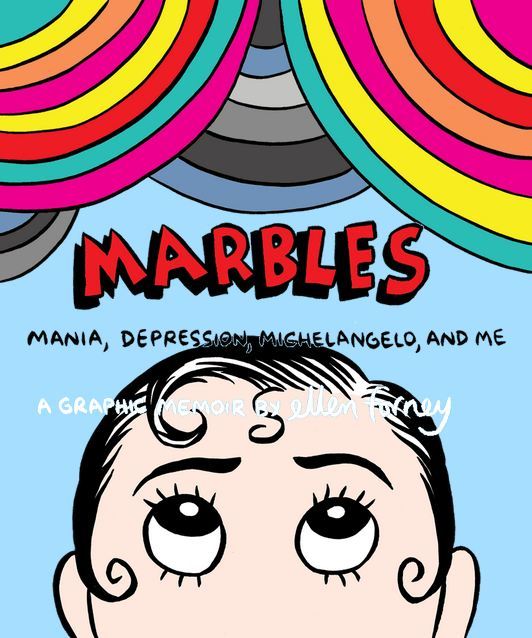Marbles: Mania, Depression, Michelangelo, and Me by Ellen Forney
Shortly before her thirtieth birthday, Forney was diagnosed with bipolar disorder. Flagrantly manic and terrified that medications would cause her to lose creativity, she began a years-long struggle to find mental stability while retaining her passions and creativity.
Searching to make sense of the popular concept of the crazy artist, she finds inspiration from the lives and work of other artists and writers who suffered from mood disorders, including Vincent van Gogh, Georgia O’Keeffe, William Styron, and Sylvia Plath. She also researches the clinical aspects of bipolar disorder, including the strengths and limitations of various treatments and medications, and what studies tell us about the conundrum of attempting to “cure” an otherwise brilliant mind.
Darkly funny and intensely personal, Forney’s memoir provides a visceral glimpse into the effects of a mood disorder on an artist’s work, as she shares her own story through bold black-and-white images and evocative prose.
One of the things I really love about graphic novels is that it’s entirely possible to read them in one sitting, inside the space of an hour or two. I started this before bed and definitely finished it all that night.
If you’ve ever been curious as to what being bipolar feels like, read this book. Forney does a great job of conveying the highs and the lows, with text, images, and spatial representations. In a weird way, I think the bipolar disorder is uniquely fit to be depicted in graphic novel form. I don’t Forney could have communicated the vast difference between the two if this were just a novel.
This is the fourth graphic novel I’ve read, the others being Fun Home by Alison Bechdel (highly recommended), Maus by Art Spiegelman, and The Watchmen by Alan Moore. I enjoyed and loved all of them. Graphic novels are very interesting, especially studying in the context of art-as-literature and literature-as-art. While I say that you can read these novels pretty quickly, you can also read them very slowly. There’s so much to take in on each page, particularly in the case of Watchmen which is just intense. No wonder it’s held up as one of the greatest examples of the genre. It really is exceptional, especially on the level of detail.
I picked up this book after seeing a review of it in a magazine (Entertainment Weekly, I think it was). I was attracted to it because I, too, have long contemplated the associations between artists and mental illness. After being part of a pretty close-knit writing department at a large university, by the end, it almost felt like if you didn’t have something “wrong” with you, you didn’t belong. Mental illnesses were worn as badges of honor, in a way. Which is not to belittle people’s struggles. I also count myself into the above category. (Generalized anxiety, depression, and a spot squarely on the obsessive spectrum of OCD, if you’re wondering what my merit badges are). A couple sections in Marbles particularly resonated with me because of this. One, the author’s struggle to decide if treating her bipolar disorder was equal to killing her creativity. In other words, whether her creativity stemmed from the “crazy”. Two, there’s a particular section where she discusses how among the community of bipolar sufferers, the numbers of meds you’ve tried are clung to like hard-fought medals of honor.
There are a lot of facts in this book, both about bipolar disorder as a disease and about the relationship between artists in history and mental illness. It’s definitely not a coincidence. I don’t think there’s a person in the modern age who’s decided to devote themselves to some type of art that hasn’t thought about whether, one day, they might become another Sylvia Plath or Virgina Woolf.
One of my favorite passages in the book, is the section where she finally tells people about her illness. None of her friends ran away screaming. All were accepting, in their own way. The interesting thing is, I think this is pretty typical of people’s experiences. Maybe it’s still taboo, maybe not, but people who really love you probably already knew you had (insert mental illness).
A diagnosis doesn’t make you a different person.




